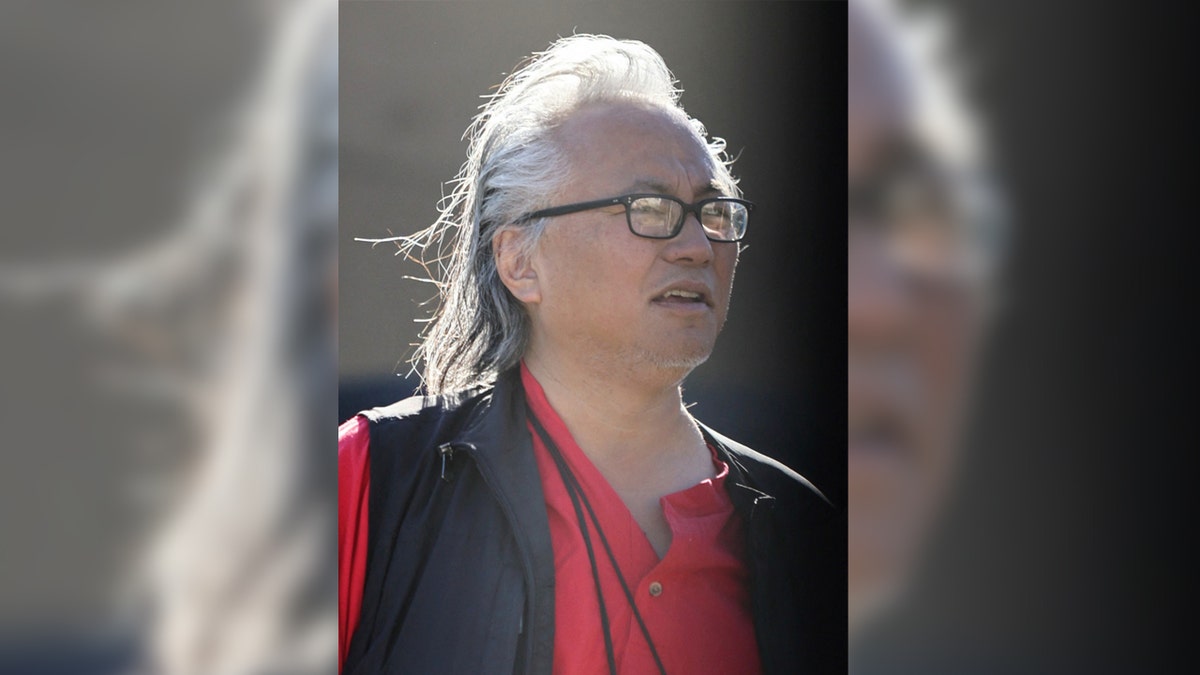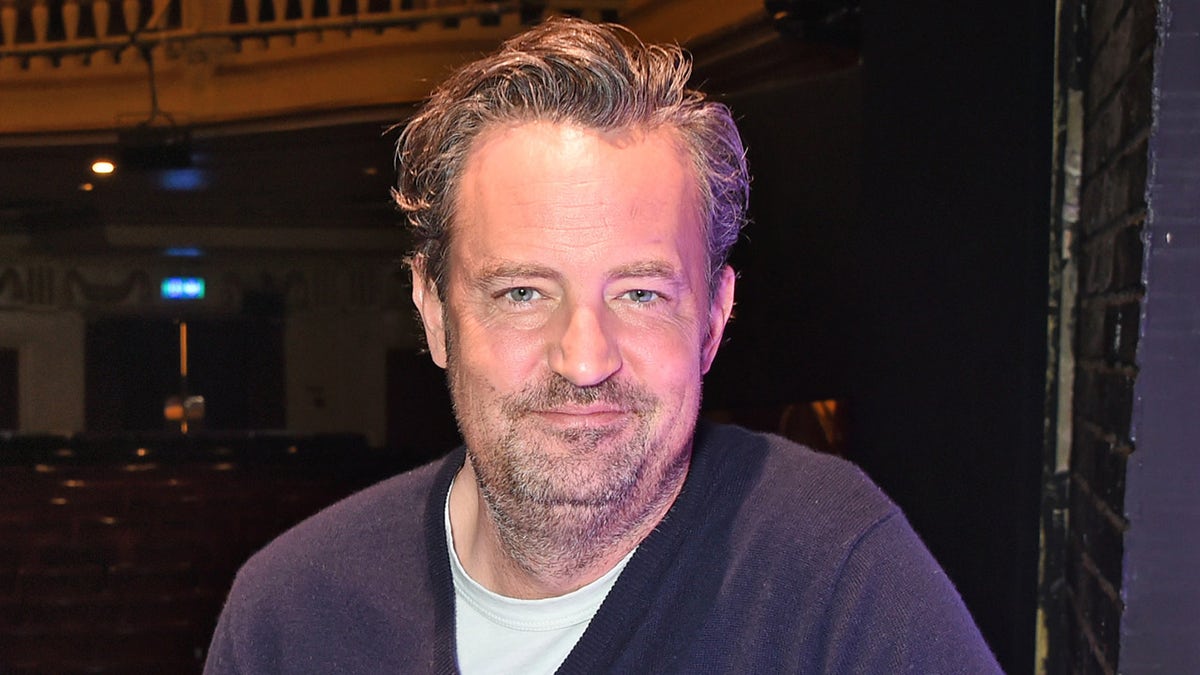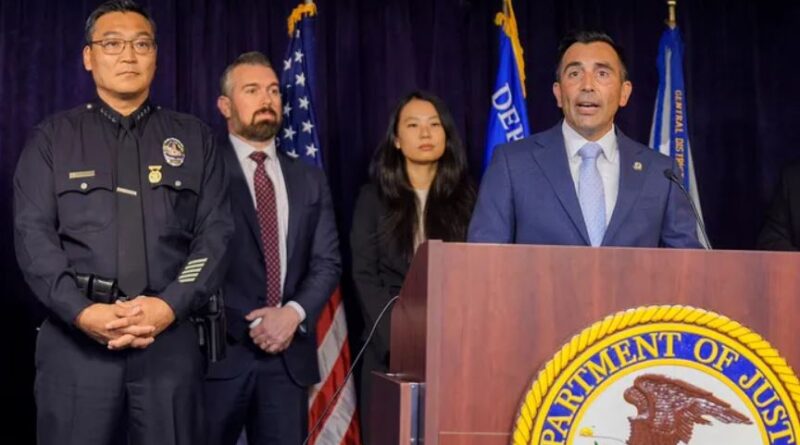Matthew Perry’s suicide investigation finds actor was exploited by ‘leeches’ in his inner circle.
Matthew Perry died in October after an overdose owing to the ‘acute effects of ketamine’.
Matthew Perry relied on several people to supply and inject the ketamine that resulted in his death overdose in October.
Martin Estrada, the U.S. Attorney for the Central District of California, revealed at a press conference Thursday that five defendants, including two doctors, had been arrested and charged with various crimes in Perry’s death.
Perry’s live-in aide, defendant Kenny Iwamasa, reportedly learned how to inject ketamine from co-defendant Dr. Salvador Plasencia, who then left vials of the dissociative anesthetic drug for Iwamasa to administer to Perry at his Pacific Palisades residence. The medication was allegedly obtained by “The Ketamine Queen,” aka Jasveen Sangha, her co-conspirator,
Dr. Mark Chavez, and intermediary, Eric Fleming.

Five people were arrested and charged in Matthew Perry’s death, including his assistant, Kenny Iwamasa, and Jasveen Sangha, aka “The Ketamine Queen.” (Getty Images/MEGA)
According to Neama Rahmani, a former federal prosecutor and the president of West Coast Trial Lawyers, Perry was taken advantage of because of his celebrity status and paid “the ultimate price” as a result.
They have these entourages that are many times like leeches,” Rahmani said. “They have a ton of money, and there are people that just take advantage of them and make money off them and milk them.
“Here’s a person with an obvious and documented opioid addiction. He’s on medication to attempt to overcome his addiction, and he’s extremely open about it. And, you know, there are people that charge him thousands of dollars for ketamine and profit from his addiction. It’s very sad.”
Plasencia allegedly wrote to Chavez in text messages that included the phrases “I wonder how much this moron will pay” and “Lets find out.” According to the indictment, Plasencia and Chavez were both medical professionals with licenses to practice in California.

Jasveen Sangha, aka “The Ketamine Queen,” was arrested and charged with multiple offenses in Matthew Perry’s death. (Jojo Korsh/BFA.com/Shutterstock)
Estrada stated at one point that the defendants gave Perry around “20 vials for approximately $50,000 in cash” so that Iwamasa could distribute the drug to the actor. During another transaction, the traffickers “took advantage of Mr. Perry” by selling around “50 vials of ketamine for approximately $11,000 in cash.”
Iwamasa acknowledged to frequently injecting Perry with ketamine without proper medical expertise, including multiple injections on the day Perry died. He pled guilty on August 7 to one count of conspiracy to distribute ketamine causing death and, according to Estrada, has already reached a plea agreement.
According to court documents, “The Ketamine Queen,” Jasveen Sangha, allegedly kept a stash house in North Hollywood, California, where she “manufactured, stored, and distributed controlled substances, including methamphetamine, a Schedule II controlled substance, and ketamine, a Schedule III controlled substance.”
According to records, Sangha had previously sold ketamine and was indicted as a result of Perry’s death inquiry for her role in Cody McLaury’s overdose death in 2019. “They have these entourages that often resemble leeches.”
They have a lot of money, and other individuals just take advantage of them to make money and milk them.”
Fleming served as a liaison between Sangha and clients, and she once told Perry’s assistant via text that she “only deals with high end and celebrities.” If it wasn’t amazing, she’d lose her business.”

Kenny Iwamasa, Matthew’s assistant, allegedly sourced and injected Perry’s fatal dose of ketamine. (APEX/MEGA)
Iwamasa agreed to buy 25 vials on October 14, 2023. One week later, on Oct. 23, Iwamasa texted Fleming, requesting “same as last time again over next two days.” Perry died four days later from ketamine, which was given on October 24.
The indictment revealed that Iwamasa injected Perry at least 18 times between October 25 and 27, including at least three times on the day Perry died.
“There are people that charge him hundreds of dollars for ketamine and take advantage of his addiction.”
It’s very sad.” Rahmani believes the matter is quite straightforward. “It’s a really solid case. The text conversations are so incriminating that numerous defendants have already pled guilty based on what is written on the wall.
The dealers have absolutely no defense. They have no DEA license or cause to possess ketamine or methamphetamine, so they’re done.”
Sangha and Plasencia were charged with one count of conspiring to distribute ketamine. Sangha was also charged with keeping a drug-involved premises, possessing methamphetamine with the purpose to distribute, possessing ketamine with the intent to distribute, and distributing ketamine on five occasions.
If convicted of all charges, Sangha faces a mandatory minimum sentence of ten years in federal prison and a statutory maximum punishment of life imprisonment. Plasencia may face up to ten years in federal prison on each ketamine-related count and up to twenty years for each record falsification charge.

United States Attorney Martin Estrada said doctors “took advantage” of Matthew Perry by selling him large amounts of ketamine, which ultimately killed him. (AP Photo/Damian Dovarganes)
Chavez agreed to plead guilty to one offense of conspiracy to distribute ketamine as part of his plea deal. The San Diego-based doctor admits to selling ketamine to Plasencia, including ketamine transferred from his previous ketamine clinic.
Eric Anderson, a former prosecutor and current counsel at Early Sullivan Wright Gizer & McRae LLP, told Fox News Digital that the allegations against those suspected in Perry’s killing are straightforward.
“If your drug dealing leads to the death of a prominent person, then you will be charged with murder, and it will not go unnoticed,” according to Anderson.

Perry often spoke about his battle with addiction and penned the 2022 memoir, “Friends, Lovers, and the Big Terrible Thing.” (Gregg DeGuire)
“Perry was a popular personality who struggled with substance problems. He was extremely open about it and his efforts to stay sober. The allegations are that those close to him, with extensive access to him, exploited his vulnerability and laughed about it. Despite prior warnings that their actions of giving and injecting Perry with ketamine posed a major health risk, they allegedly continued to do so.”
According to Rither Alabre, a former New York prosecutor and partner in Blank Rome LLP’s White Collar Group, prosecutors are “definitely sending a strong message” to “There has been a recent pattern of prosecutors charging dealers who provided the drugs which led to the deaths of other high-profile individuals,” Alabre told the court.
“For example, federal prosecutors in the Southern District of New York (SDNY) accused the distributor of the fentanyl-laced heroin that killed actor Michael K. Williams (The Wire), and the dealer was sentenced to 10 years in prison last year. SDNY prosecutors also charged the drug dealer who caused the death of Robert De Niro’s grandson, and she faces up to 20 years in jail for each of the two offenses.dealers by charging them in this high-profile case.
“If your drug dealing leads to the death of a famous person, then you will be charged with murder, and it won’t go unnoticed.”
Alabre emphasized the necessity of federal prosecutors assuming the lead on the Perry probe owing to their access to more resources and capacity to collaborate with other authorities.
“The defendants are more likely to get much higher sentences in federal court,” he said. “In Perry’s death case, one of the defendants faces a minimum of 10 years and a maximum of life in prison.” The prosecution prosecuted not just the sellers, but also two doctors (not Perry’s regular doctors), who are accused of providing the medications to the dealers, demonstrating the strong message that prosecutors are conveying in these types of cases.
The “Friends” star died on October 28 after apparently drowning in a hot pool at his home in the Pacific Palisades neighborhood of Los Angeles. He was 54.
Source

Facebook Comments